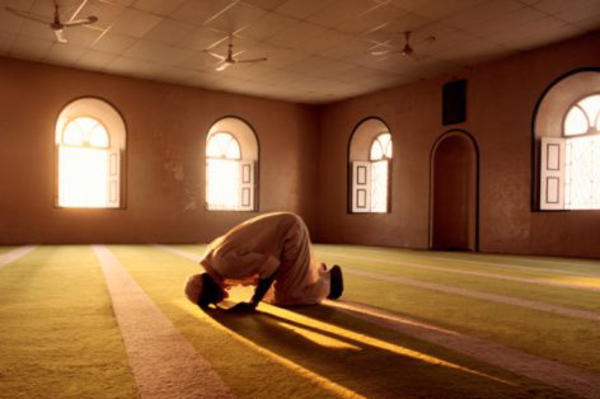
Here are various fataawa (rulings) by the Scholars, past and present, regarding different questions asked about making ‘itikaaf during Ramadhan.
Question: We would like to know what is meant by “i’tikaaf” and it’s ruling?
Response: I’tikaaf is for a person to confine himself to the masjid in obedience to Allaah (Subhaanahu wa Ta’aala) so as to separate himself from the people and free himself [from the chores of daily life] to exert himself in worshipping Allaah. This can take place in any masjid, whether it is a masjid in which people gather for the Jumu’ah prayer or not. However, it is better [to perform the i’tikaaf] in a masjid in which the people gather for the Jumu’ah prayer so that one performing i’tikaaf is not forced to leave the masjid [in which he is doing i’tikaaf] to go to another masjid for the Jumu’ah prayer.
Reference: Fataawa Ramadhaan – Volume 2, Page 861, Fatwa No.846
Fiqh al-‘Ibaadaat, Shaykh Muhammad ibn Saalih al-’Uthaymeen– Page 208
Question: What are the conditions of i’tikaaf, and is fasting one of them?
Is it permissible for the person in i’tikaaf to visit a sick person, answer an invitation, fulfil some of his family’s needs, or go to work?
Response: I’tikaaf is prescribed in a masjid in which the congregational prayer is established. If the person in i’tikaaf is from those upon whom Friday prayers are obligatory and the length of his i’tikaaf includes a Friday, then it is better to be in a masjid in which Friday prayers are established. Fasting is not [a] necessary [part of it]. The Sunnah is that he does not visit the sick during his i’tikaaf and that he does not answer the invitation, nor fulfil the needs of his family. He should not witness the funeral [by following it] and he should not go to work outside the masjid. This is due to what has been authenticated on the authority of ‘Aa.ishah (radhi-yAllaahu ‘anhaa) that she said: “…the Sunnah for he who is in i’tikaaf is that he does not visit the sick nor witness a funeral, nor touch a woman (his wife), nor have intercourse with her nor leave to fulfil a need except that which is necessary”.
And with Allaah lies all the success, and may Allaah send prayers and salutations upon our Prophet Muhammad (sal-Allaahu ‘alayhi wa sallam) and his family and his companions.
Reference: Fataawa al-Lajnah ad-Daa.imah lil-Buhooth al-‘Ilmiyyah wal-Iftaa. – Fatwa No.6718
Fataawa Ramadhaan – Volume 2, Page 862, Fatwa No.848
Question: What is the ruling of i’tikaaf, and is it permissible to do it in other than the masaajid (plural of masjid)?
Response: I’tikaaf is sunnah (recommended but not obligatory), and is not correct except in the masaajid.
Firstly: Because Allaah the Majestic the High said:
{…while you are in i’tikaaf in the masaajid} [Soorah al-Baqarah, Aayah 187].
He also said:
{…that they should purify My House for those who circumambulate it and make i’tikaaf in it} [Soorah al-Baqarah, Aayah 125].
The “House” is al-Masjid al-Haraam [in Makkah].
Secondly: If he were to make i’tikaaf in other than the masaajid, it would lead him to missing prayers with the congregation of Muslims in the masaajid and leaving it is a great sin. Or it would lead him to frequently go to the prayer, and his frequent leaving, going and coming contradicts the i’tikaaf, because the i’tikaaf is that the one doing it attaches himself [to the place of his i’tikaaf].
Reference: Fataawa Ramadhaan – Volume 2, Page 869, Fatwa No.855
Fataawa as-Siyaam libni Jibreen – Page 111
Question: Does i’tikaaf have a fixed time or is it restricted to Ramadhaan, or is it permissible in other than Ramadhaan?
Response: What is prescribed is that it should be in Ramadhaan only. This is because the Prophet (sal-Allaahu ‘alayhi wa sallam) did not make i’tikaaf in other than Ramadhaan, except what he (sal-Allaahu ‘alayhi wa sallam) did in Shawwaal, after having left doing i’tikaaf in Ramadhaan one year, and so did it in Shawwaal. Yet if a person was to make i’tikaaf in other than Ramadhaan it would be permissible, because ‘Umar (radhi-yAllaahu ‘anhu) asked the Prophet (sal-Allaahu ‘alayhi wa sallam) saying: “I vowed to do i’tikaaf for a night or a day in the Masjid al-Haraam.” The Messenger of Allaah (sal-Allaahu ‘alayhi wa sallam) said:
«Fulfil your vow».
Reference: Fataawa Ramadhaan – Volume 2, Page 864, Fatwa No.851
Fiqh al-Ibaadaat libni ‘Uthaymeen – Page 208
Question: Is it correct for one who is in the state of i’tikaaf to teach someone or [even] give a lecture?
Response: That which is better is for the one in the state of i’tikaaf to busy himself with specific acts of worship such as dhikr (remembrance of Allaah), prayer, reading the Qur.aan and that which is similar. However, if there is a need to teach someone or to learn, then there is no harm in this as this is [also] from the remembrance of Allaah.
Reference: Fataawa Ramadhaan – Volume 2, Page 876, Fatwa No.863
Fataawa Shaykh Ibn ‘Uthaymeen – Volume 1, Pages 549
Question: When does a person leave i’tikaaf, is it after sunset on the night prior to ‘Eed or after Fajr on the day of ‘Eed?
Response: The person in i’tikaaf leaves i’tikaaf once Ramadhaan finishes and it finishes as the sun sets the night prior to ‘Eed. He enters i’tikaaf at sunset [prior] to the 20th day of Ramadhaan. This is so as the last ten [nights] of Ramadhaan start from sunset of the night [prior] to the 20th day of Ramadhaan and ends at sunset of the night [prior] to ‘Eed.
Reference: Fataawa Ramadhaan – Volume 2, Page 872, Fatwa No.859
Fataawa ash-Shaykh Muhammad as-Saalih al-‘Uthaymeen – Volume1, Page 551
Question: Is the caretaker’s room or the room in which the Zakaah Committee meet in the masjid acceptable as a place to do i’tikaaf, keeping in mind that the doors to these [two] rooms are within the masjid?
Response: The rooms and the doors leading to them which are within the masjid are regarded as [within] the masjid. However, if the rooms were outside the masjid despite their doors being in the masjid, then they (the rooms) are not regarded as within the masjid.
And with Allaah lies all success, and may Allaah send prayers and salutations upon our Prophet Muhammad (sal-Allaahu ‘alayhi wa sallam) and his family and his companions.
Reference: Fataawa Ramadhaan – Volume 2, Page 873, Fatwa No.860
Fataawa al-Lajnah ad-Daa.imah lil-Buhooth al-‘Ilmiyyah wal-Iftaa. – Fatwa No.6718
Question: Is it permissible for the one in a state of i’tikaaf to leave the Haram (i.e. al-Masjid al-Haraam in Makkah or al-Masjid an-Nabawee in Madeenah) to go and eat or drink?
And is it permissible for him to ascend to the roof of the masjid to listen to the lectures?
Response: Yes, it is permissible for one in the state of i’tikaaf in al-Masjid al-Haraam [in Makkah] or other than it, to leave [the masjid] to go to eat or drink if he is unable to bring these [supplies] to the masjid. This is because this is something which is necessary, just as he would need to leave to answer the call of nature and, likewise, he would have to leave to perform ghusl if he is in the state of janaabah [as in the case of the one who has a wet dream].
As regards ascending to the roof of the masjid, then even this does not affect [his i’tikaaf] because leaving the masjid from any of the [exit] doors, intending by it to return to the masjid by proceeding to the roof are only a matter of a few steps. (So) there is no harm in this.
Reference: Fataawa Ramadhaan – Volume 2, Page 879, Fatwa No.867
al- Fataawa libni-‘Uthaymeen – Kitaab -ad’Da’wah – Volume 1, Pages 205-206
Question: Is it permissible for one who wishes to perform the i’tikaaf to specify a particular day itself for i’tikaaf?
Response: It is not for him to specify a particular day itself within which to regularly perform i’tikaaf, rather, he should take care to perform i’tikaaf in the last ten [days and nights] of Ramadhaan in accordance with [the guidance of] the Prophet (sal-Allaahu ‘alayhi wa sallam).
And with Allaah lies all success, and may Allaah send prayers and salutations upon our Prophet Muhammad (sal-Allaahu ‘alayhi wa sallam) and his family and his companions.
Reference: Fataawa Ramadhaan – Volume 1, Page 893, Fatwa No.880
Fataawa al-Lajnah ad-Daa.imah lil-Buhooth al-‘Ilmiyyah wal-Iftaa. – Fatwa No.8701
Question: Is [engaging in] i’tikaaf in other than Ramadhaan permissible? And what is its [legislated] duration?
Response: [Engaging in] i’tikaaf is permissible at any time during Ramadhaan and other than it; However, [engaging in] i’tikaaf during Ramadhaan is better [as it is] in accordance with [what] the Prophet (sal-Allaahu ‘alayhi wa sallam) [did], as well as for the superiority of the time (the month of Ramadhaan). And [engaging in i’tikaaf] does not have any specified duration, [however] the longer the duration [one engages in i’tikaaf] the better, so long as [doing so] does not occupy him from that which is more important than it from [other] acts of worship as well as seeking provision (i.e. maintaining one’s job).
Reference: ad-Durar an-Naadhirah fil-Fataawa al-Mu’aasirah – Page 380; ad-Da’wah 1550 – Rabee’ al-Awwal 1417AH
Question: Is it permissible for a woman to perform i’tikaaf at the place of prayer in her home?
Response: No. If a woman wishes to perform i’tikaaf, then she should do so in a masjid, so long as there is no danger in that [such as free-mixing and complacency regarding the hijaab, etc]. [However], if there is any danger in that, then she should not perform i’tikaaf.
Reference: Fataawa Ramadhaan – Volume 2, Page 891, Fatwa No.877
Fiqh al-‘Ibaadaat – Page 209
Question: What is the ruling of the person whose father did not allow him to do i’tikaaf for unconvincing reasons?
Response: I’tikaaf is Sunnah (recommended) and righteousness to parents is obligatory, and a recommended act does not override an obligation. It does not contradict the obligation in any way because the obligation takes precedence over it. Allaah the most High said in a hadeeth qudsee:
«My servant does not come closer to Me with something more beloved to Me than that which I have obligated upon him».
So, if your father orders you not to do i’tikaaf, and mentions reasons that mean you do not do i’tikaaf due to his need of you during that time, then the father is the one to weigh that up not you. This is because the scale you have may be unjust and inaccurate. This is because you desire to do i’tikaaf, so you do not consider these excuses as justifiable whereas your father considers them justifiable. So what I advise you is not to make i’tikaaf. Yes, if your father said not to make i’tikaaf without mentioning any just reason for that, you would not be obliged to obey him in this case, as you are not obliged to follow him in a matter which in disobeying him would not cause any harm to him and in obeying him would cause disadvantage to you.
Reference: Fataawa Ramadhaan – Volume 2, Page 878, Fatwa No.866
Fataawa ash-Shaykh Muhammad as-Saalih al-‘Uthaymeen – Volume 1, Pages 551-552
